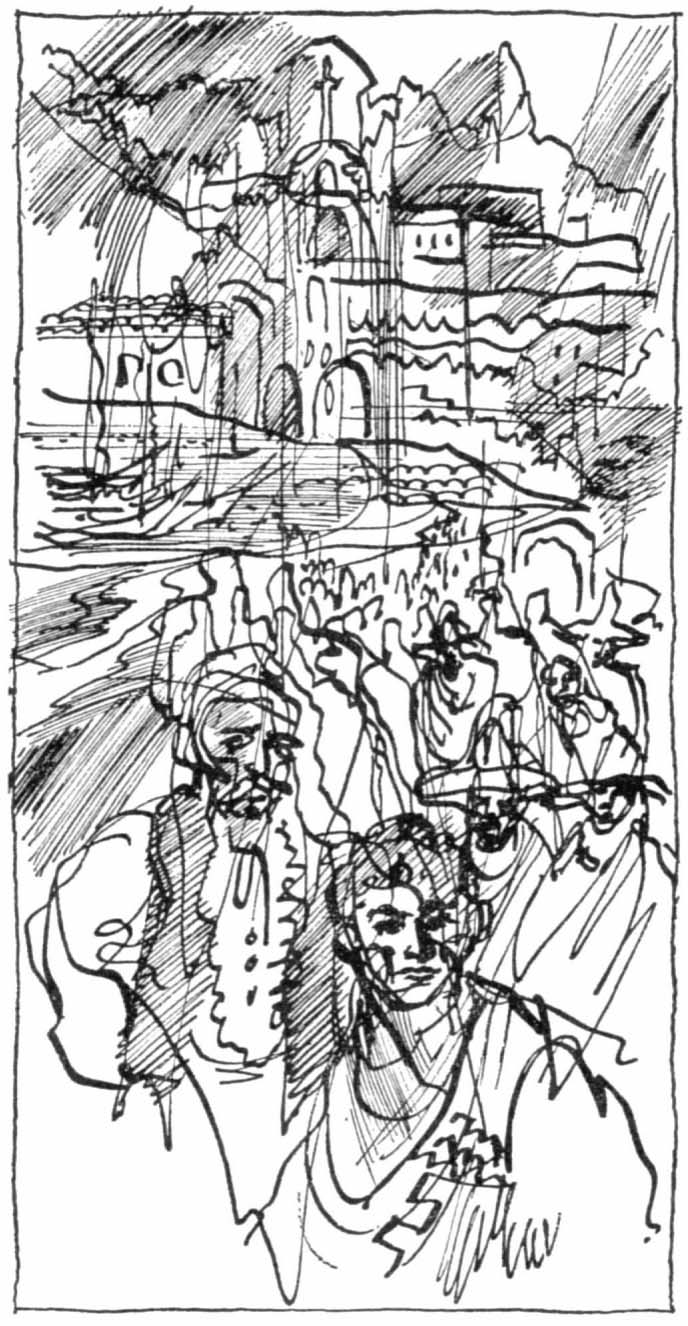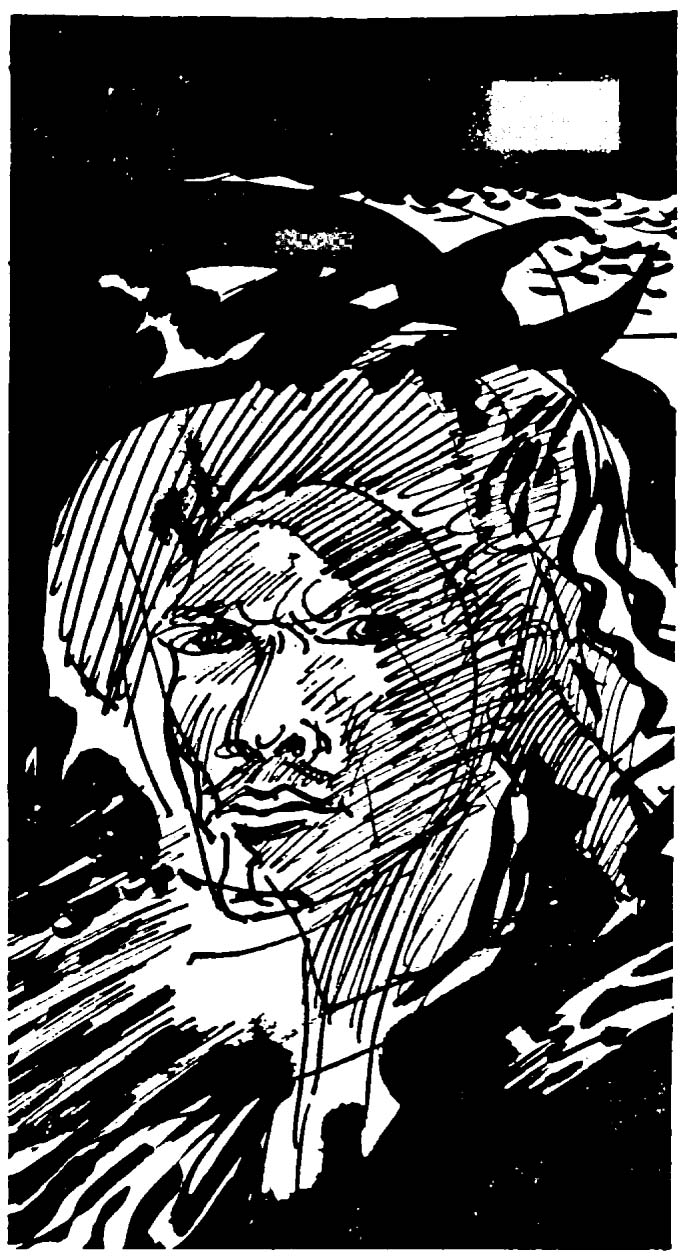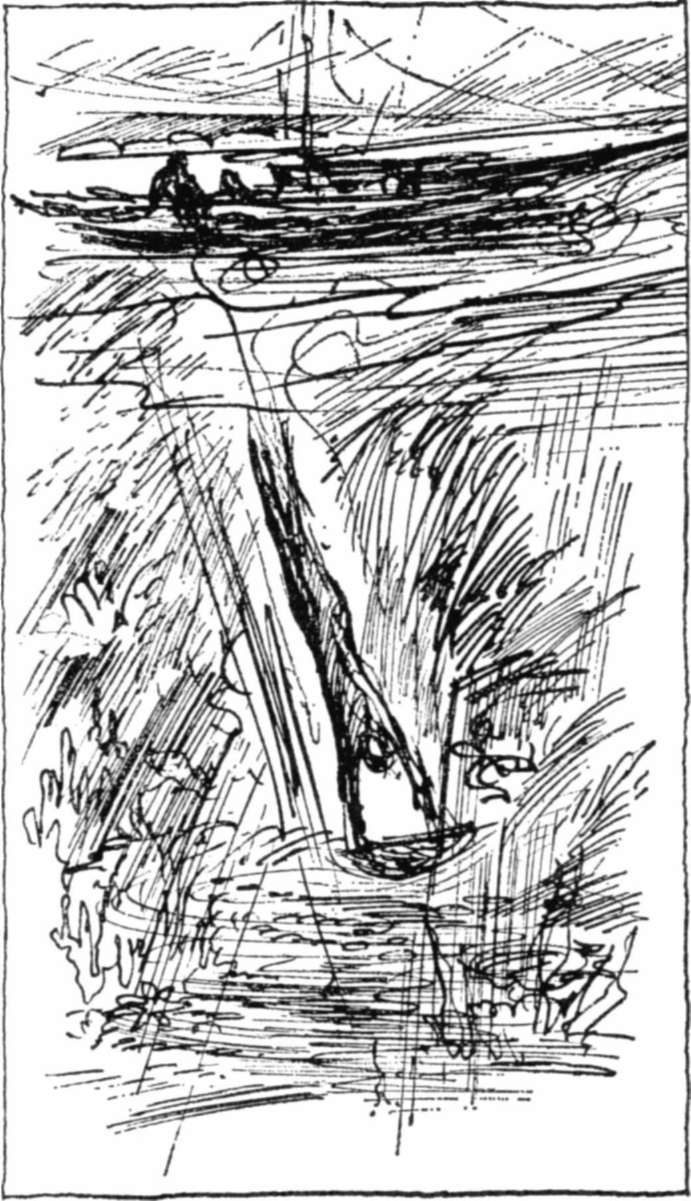The Black Pearl (2 page)
Authors: Scott O'Dell

My father waited, watching through the slit, until his message was sent forward by Ovando.
"If you go with the fleet," he said, "then all the male members of the Salazar family will be on the sea at once. What happens if a storm comes up and drowns the both of us? I will tell you. It is the end of Salazar and Son. It is the end of everything I have worked for."
"The sea is calm, sir," I answered.
"These words prove you a true landsman. The sea is calm today, but what of tomorrow? Tomorrow it may stand on end under the lash of a chubasco."
"It is still a week or two before the big wind comes."
"What of the sharks? What of the devilfish that can wring your neck as if it were the neck of a chicken? And the giant mantas by the dozens, all of them the size of one of our boats and twice as heavy? Tell me, what do you do with these?"
"I have the knife that grandfather gave me."
My father laughed and the sound bounded through the room like the roar of a bull.
"Is it a very sharp knife?" he asked scornfully.
"Yes, sir."
"Then with much luck you might cut off one of the eight arms of the devilfish, just before the
other seven wrap around you and squeeze out your tongue and your life."
I took another breath and brought forth my best argument.
"If you allow me to go, sir, I shall stay on deck while the others dive. I shall be the one who pulls up the basket and minds the ropes.'
I watched my father's face and saw that it had begun to soften.
"I can take the place of Goleta," I said quickly, to follow up the advantage I had gained. "There is an apology to make, sir. At noon Goleta's wife came to say that her husband is sick and cannot sail. I forgot to tell you."
My father walked to the iron door and opened it. He looked at the sky and at the glossy leaves of the laurel trees that hung quiet on their branches. He closed the door and put the tray of pearls in the safe and turned the bolt.
"Come," he said.
Quickly I picked up my bundle and in silence we went into the street and up the winding path to the church high on the bluff. My father always came here before the fleet sailed to ask the protection of the Madonna against the sea's dangers. And when the fleet came home the first thing he did was to hurry here and offer thanks for its safe return.
The church was deserted, but we found Father Gallardo and aroused him from his afternoon siesta. While he stood beside the Virgin and held his arms outstretched in benediction we knelt and bowed our heads.
"We ask Your mercy for these men," Father Gallardo said. "Give them good winds and good tides. Guard them against the hazards of the deep waters, make their journey fruitful in all ways, and bring them back in health."
I glanced up at the Madonna as Father Gallardo finished his benediction. She stood calmly in her niche fashioned of seashells, dressed all in white velvet. She had the face of a child, but she was really a young woman, neither Indian nor Spanish, with broad Indian cheeks of a golden brown, and eyes of the women of Castile, large and shaped like almonds.
I had always loved her, yet never so much as I did at this moment. I was still gazing at her when my father gave me a pinch on the shoulder and motioned me to follow.
 
We went outside and stood for a moment under the laurel trees.
"I note the bundle under your arm," my father said, "so you must have told your mother when you left this morning."
"I said nothing to her. But I shall go now to tell her that I am leaving."
"No, I will send someone with a message. If you go it will take time. We are already late. Besides, there will be tears and lamentations, which are poor heralds for a voyage."
He summoned a boy who was watching us from a distance and gave him a message to take to my mother. Then we went down the hill toward the beach. The sun was setting, yet I could clearly see the fine blue boats of our fleet riding at anchor. In the fading light they looked silver, like live silver fish floating there. Beyond them the harbor stretched away for leagues between the headlands to the island of Espiritu Santo and the open sea.
I wanted to ask my father many things as we went down the hill, but my head was buzzing with excitement and I could think of nothing to say.
T
HERE WERE FIVE BOATS
in our fleet. Each was about twenty feet long and broad-beamed, with a high prow and stern like a canoe, and a small square sail. They were built on the beach of our town, but the wood came from the mahogany forests of Mazatlan. Each was named after a saint and all were painted blue, the blue of the sea where the water is very deep.
Each boat carried four or five men. On our boat, the
Santa Teresa,
there were besides my father and myself an Indian and a young man named Gaspar Ruiz.
This Ruiz had come to our town about a month before from Seville in Spain, or so he said, and therefore we called him the Sevillano.
He was tall and his shoulders were so wide and powerful that they seemed to be armored in steel instead of muscle. His hair, which was gold-colored, grew thick on his head like a helmet. He had blue eyes, so blue and handsome that any girl would have envied them. His face was handsome, too, except that around his mouth there always lurked the shadow of a sneer.
Besides this, nowhere on the Vermilion Sea could you find a better diver for pearls than Gaspar Ruiz. There were some who could stay under water for longer than two minutes, but to the Sevillano three minutes was an easy dive. And once when he had to hide from a large gray shark he was down four minutes and came up laughing.
Also he was a great braggart about the things he had done in Spain and elsewhere. Not only did he brag about these things, but many of them were tattooed on his body. There was a picture in red and green and black ink of Gaspar Ruiz fighting an octopus that had a dozen tentacles. Another showed him thrusting a long sword into a charging bull. Still another showed him choking a mountain lion to death with his bare hands.
These scenes were tattooed on his shoulders and arms and even on his legs, so that he looked very much like a picture gallery walking around.
We had not sailed far that night before the Sevillano began to talk about himself. He sat with his back against the mast and told a long story of how he had once dived in the Gulf of Persia and there found a pearl bigger than a hen's egg.
"What did you do with it?" my father asked.
"I sold it to the Shah."
"For much money?"
"Much," said the Sevillano. "So much that I bought a pearling fleet of my own. It was larger than yours. Today I would be a rich man if it had not foundered in a bad storm."
The Sevillano went on to tell about the storm, which must have been the greatest ever seen in the world, and how he saved his own life and the lives of his crew.
Before I became a partner with my father, sometimes I used to see him on the beach when the boats went out or when they came in and sometimes in the plaza. He always had a group around him, listening to his tales, but somehow I felt that he was talking to me more than to the others. Once when I questioned him in fun about one of these tales that I knew to be a lie, he turned on me.
"You do not believe that I tell the truth?" he said, clenching his teeth. Before I could answer,

he said, "You are the son of a rich man and you live in a big house and you eat good food and all of your life you have done little. Nor will you ever do more."
Too surprised to speak, I was silent. He watched me for a moment and then took a step toward me and lowered his voice. "Your father is a rich man. My father was a poor man whose name I do not know. From the time I could walk I have done something and in my life I have done many things and what I have done I talk about truthfully. So guard your tongue, mate."
I mumbled an apology and walked away, but when he thought I was out of hearing I heard him say to his friends, "That one who just left us. Have you noticed the red hair that sticks up on his head like the comb of a rooster? Well, that comes from Africa. It is from the infidel blood of Moors and Berbers."
I was about to turn around and confront him. He was older than I and stronger and he carried a knife at his belt, but it was not this that held me back. I knew that my father would think it an insult to the Salazar name for me to start a brawl in a public place, no matter what the cause. So I swallowed my pride and I walked on as if I had not heard.
I said nothing to my father about this encounter, and afterward when I met the Sevillano I said nothing to him. I acted as if I did not remember what he had said to me or what I had overheard. And when I became a partner in the firm and he would come to the office to get his pay, I acted no differently. Yet I had not forgotten the encounter nor, I am sure, had he.
On this night as we sailed out of the harbor and he sat and told the tall tale about the storm and his rescuing the whole crew of his pearling fleet, I felt that he was talking to me more than to the others. I felt that he was trying to goad me into saying something as I had before, so that he could make me uncomfortable in front of my father. I therefore listened and kept silent.
We reached the pearling beds at dawn and anchored the five boats in a cluster over a reef where the shells grew.
Everything was new to me. I had heard many stories of the pearling beds since the time I was old enough to listen, from my father and grandfather and from my friends who were the sons of
pearlers. But to be really there on the sea with the sun coming up in a coppery haze and watch the men slip out of the boats into water clear as air, was to me a part of a long dream come true.
My father showed me how to pull up the basket when it was full and how to stack the shells in the boat. Then he took the sink stone in one hand, carefully coiled the rope that was attached to it and tied to the boat, picked up the basket and its rope, and went over the side. Down he went with the heavy stone until he reached the bottom.
Through the clear water I watched him drop the stone, take the big knife from his belt, and start to pry the oyster shells from the rocks. When the basket was full he gave a tug at the rope and I pulled it up. A moment later he rose, trailing a stream of bubbles from his mouth, and I stacked the shells as I had been told and drew up the sink stone for the next dive.
The Sevillano had gone down before my father and was still down as he dived again. When the Sevillano came to the surface he held onto the side of the boat and glanced up at me.
"How does the work go?" he said.
"I learn."
"There is not much to learn, mate. You pull the shells up and then the sink stone and you stack the shells and then you wait a while and do it all over again. It is work for children."
He spoke softly and smiled, but I knew what he meant. "It would be fun to dive," I answered him.
"More fun, mate, but more danger too."
He pointed to the arm he was resting on the gunwale. From his elbow to wrist ran a long, jagged scar, as if the arm had been pulled through the jaws of a steel trap.
"This one," he said, "I got from a burro clam. I put my hand down deep into a crevice and snap, it was not a crevice but the mouth of a burro, the father of all burros. Señor Clam had me tight, but I did not leave my arm with him, as you can see. That was in the Gulf, yet there are many burros here in the Vermilion." He looked up at me again and smiled. "It is better, mate, that you stay in the boat."
The Indian who was working with the Sevillano handed him the sink stone and the Sevillano went down, saying nothing more to me. Nor did he speak to me again that morning. At midday the
Santa Teresa
was loaded with shells and low
